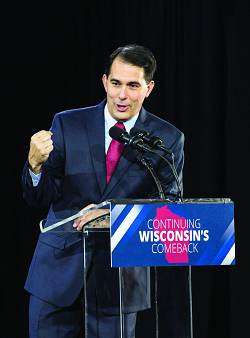Scott Walker the Governor vs. Scott Walker the Candidate
Which one is running?
Wisconsin Gov. Scott Walker has been unofficially running for the GOP presidential nomination for months now. Today, he makes it official. Here's his announcement video.
Walker's video opens with a cheery narrator declaring that, "For too long, they've said we have to compromise our principles to win."
The video goes on to portray Walker as a conservative reformer dedicated to winning meaningful policy fights. Walker "balanced budgets. Cut taxes. Beat the special interests. Improved education," the narrator says while Wisconsin newspaper headlines about his legislative victories flash by.
Later in the video, Walker talks directly to the camera, making the case himself. "Wisconsin—we didn't nibble around the edges," he says. "We enacted big, bold reforms." After a few not-so-veiled jabs at his fellow Republican nominees—("In the Republican field, there are some who are fighters, but they haven't won those battles.")—Walker goes on to connect his policy successes with his political victories. "Without sacrificing our principles, we won three elections in four years in a blue state."

In the video, in other words, Walker makes it clear that he is running on his record as governor. It is this record that helped launch Walker, somewhat unexpectedly, to the top of the GOP presidential field earlier this year.
In January and February, Walker gave a series of speeches that highlighted elements of his state-level record, dwelling at length on a series of economic success measures, as well as tales of his fortitude as he faced massive union protests—plus a recall election—as a result of his ultimately successful attempts to overhaul the state's public sector union benefits.
To be sure, in the video, Walker's defense of his record is not quite as detailed or aggressive as in many of those speeches; he does not, for example, explicitly mention unions, talking instead about his battles with "special interests." (Unions, of course, are still mentioning him; "Scott Walker is a national disgrace," read a one-sentence press release from AFL-CIO president Richard Trumpka.)
But still, the Scott Walker in the announcement video is a largely recognizable version of Scott Walker, the did-something-candidate, the governor whose record of legislative accomplishments provided the key to his surprisingly strong early appeal.
Yet for the last few months, as his proto-campaign has come alive and adjusted to the national spotlight, Walker has frequently strayed from the focus on his own record. As The New York Times noted recently, Walker has turned from his own record on a number of high profile issues.
As governor, Walker said that the fight over same-sex marriage had reached its end, saying that, "For us, it's over in Wisconsin." As a candidate, following the Supreme Court's recent decision in favor of legal same-sex marriage in every state, he called for Americans to join him in support of a constitutional amendment allowing states to ban those marriages.
As governor, Walker declared his opposition to a federal ethanol mandate, calling it a "big-government proposal" and saying that "the free-enterprise system must drive innovation to relieve our dependence on foreign oil, not mandates from the state or federal government." As a candidate, he seems to have decided that federal mandates weren't so bad, saying in March that he was "willing to go forward on continuing the Renewable Fuel Standard and pressing the EPA to make sure there's certainty in terms of the blend levels set."
As a governor, Walker said repeatedly that he supported a pathway to citizenship for immigrants who are currently in the country illegally. As a candidate, Walker has said that he no longer supports comprehensive immigration reform, and has derided such plans as "amnesty." Walker's long record of support for more open immigration was clear enough that he could not pretend otherwise. "My view has changed," he admitted. "I'm flat out saying it."
The distance between Walker the governor and Walker the candidate is arguably the central tension for the Walker campaign as it officially launches. Walker the candidate has set his sights on winning in Iowa, and has adjusted his positions accordingly.
And so it is worth remembering that it was Walker the governor whose legislative battles and accomplishments first garnered him national attention, Walker the governor who won three state elections in four years, and Walker the governor who, earlier this year, rose so quickly to the top of GOP's 2016 field. Meanwhile, it is Walker the candidate who has slipped in the polls as the months have gone by.
Walker the governor looks like someone who, as his campaign launch video says, doesn't buy the conventional wisdom that "we have to compromise our principles to win." Walker the candidate, on the other hand, looks like someone who already has.


Show Comments (63)